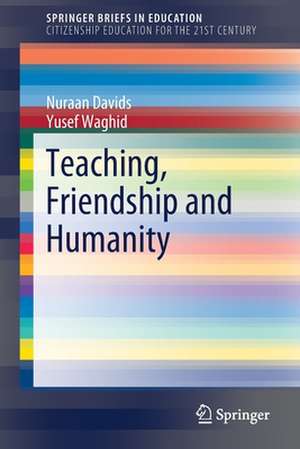Teaching, Friendship and Humanity: SpringerBriefs in Education
Autor Nuraan Davids, Yusef Waghiden Limba Engleză Paperback – 28 aug 2020
Din seria SpringerBriefs in Education
-
 Preț: 317.28 lei
Preț: 317.28 lei -
 Preț: 478.71 lei
Preț: 478.71 lei - 20%
 Preț: 387.44 lei
Preț: 387.44 lei - 17%
 Preț: 392.10 lei
Preț: 392.10 lei -
 Preț: 196.30 lei
Preț: 196.30 lei -
 Preț: 394.41 lei
Preț: 394.41 lei -
 Preț: 356.32 lei
Preț: 356.32 lei -
 Preț: 444.52 lei
Preț: 444.52 lei -
 Preț: 196.15 lei
Preț: 196.15 lei -
 Preț: 262.86 lei
Preț: 262.86 lei -
 Preț: 370.61 lei
Preț: 370.61 lei -
 Preț: 376.59 lei
Preț: 376.59 lei -
 Preț: 379.68 lei
Preț: 379.68 lei -
 Preț: 408.44 lei
Preț: 408.44 lei -
 Preț: 376.22 lei
Preț: 376.22 lei -
 Preț: 378.34 lei
Preț: 378.34 lei -
 Preț: 346.59 lei
Preț: 346.59 lei -
 Preț: 377.18 lei
Preț: 377.18 lei -
 Preț: 377.35 lei
Preț: 377.35 lei -
 Preț: 476.03 lei
Preț: 476.03 lei -
 Preț: 376.43 lei
Preț: 376.43 lei -
 Preț: 379.48 lei
Preț: 379.48 lei -
 Preț: 479.29 lei
Preț: 479.29 lei -
 Preț: 340.61 lei
Preț: 340.61 lei -
 Preț: 377.18 lei
Preț: 377.18 lei -
 Preț: 377.57 lei
Preț: 377.57 lei -
 Preț: 376.59 lei
Preț: 376.59 lei -
 Preț: 377.18 lei
Preț: 377.18 lei -
 Preț: 380.84 lei
Preț: 380.84 lei -
 Preț: 379.09 lei
Preț: 379.09 lei -
 Preț: 354.10 lei
Preț: 354.10 lei -
 Preț: 377.95 lei
Preț: 377.95 lei -
 Preț: 379.68 lei
Preț: 379.68 lei -
 Preț: 377.35 lei
Preț: 377.35 lei -
 Preț: 346.59 lei
Preț: 346.59 lei -
 Preț: 444.52 lei
Preț: 444.52 lei -
 Preț: 376.22 lei
Preț: 376.22 lei -
 Preț: 381.21 lei
Preț: 381.21 lei -
 Preț: 348.13 lei
Preț: 348.13 lei -
 Preț: 409.25 lei
Preț: 409.25 lei -
 Preț: 410.17 lei
Preț: 410.17 lei -
 Preț: 377.57 lei
Preț: 377.57 lei -
 Preț: 380.63 lei
Preț: 380.63 lei -
 Preț: 376.59 lei
Preț: 376.59 lei -
 Preț: 377.57 lei
Preț: 377.57 lei -
 Preț: 380.07 lei
Preț: 380.07 lei -
 Preț: 378.54 lei
Preț: 378.54 lei -
 Preț: 379.48 lei
Preț: 379.48 lei -
 Preț: 377.73 lei
Preț: 377.73 lei -
 Preț: 342.74 lei
Preț: 342.74 lei
Preț: 378.71 lei
Nou
Puncte Express: 568
Preț estimativ în valută:
72.47€ • 78.70$ • 60.88£
72.47€ • 78.70$ • 60.88£
Carte tipărită la comandă
Livrare economică 23 aprilie-07 mai
Preluare comenzi: 021 569.72.76
Specificații
ISBN-13: 9789811572111
ISBN-10: 9811572119
Pagini: 109
Ilustrații: XIX, 109 p. 1 illus.
Dimensiuni: 155 x 235 mm
Greutate: 0.2 kg
Ediția:1st ed. 2020
Editura: Springer Nature Singapore
Colecția Springer
Seriile SpringerBriefs in Education, SpringerBriefs in Citizenship Education for the 21st Century
Locul publicării:Singapore, Singapore
ISBN-10: 9811572119
Pagini: 109
Ilustrații: XIX, 109 p. 1 illus.
Dimensiuni: 155 x 235 mm
Greutate: 0.2 kg
Ediția:1st ed. 2020
Editura: Springer Nature Singapore
Colecția Springer
Seriile SpringerBriefs in Education, SpringerBriefs in Citizenship Education for the 21st Century
Locul publicării:Singapore, Singapore
Cuprins
Preface: Loving humanity is an extension of democratic citizenship education.- Chapter 1: Educational encounters, mutuality, trust and respect.- Chapter 2: Educational encounters as friendships.- Chapter 3: Educational encounters, autonomy and liberty.- Chapter 4: Educational encounters, deliberative iterations, and everyday talk.- Chapter 5: Educational encounters as loving relations.- Chapter 6: Educational encounters, and liquid love.- Chapter 7: Educational encounters, critical praxis and love.- Chapter 8: Educational encounters and the promise of a love that can heal hatred.- Chapter 9: Educational encounters and whatever singularity (the lovable).- Chapter 10: On thinking differently about educational encounters: on subjective (loving) encounters.
Notă biografică
Nuraan Davids is a Professor of Philosophy of Education in the Department of Education Policy Studies,Stellenbosch University. Her research interests include democratic citizenship education; Islamic philosophy of education; and ethics in education. She is an Associate Editor of the South African Journal of Higher Education and an Editorial Board Member for both Ethics and Education and the Journal on Education in Muslim Societies.
Yusef Waghid is a Distinguished Professor of Philosophy of Education in the Department of Education Policy Studies, Stellenbosch University, South Africa. Yusef holds doctorates in the areas of Philosophy of Education (Western Cape, 1995), Education Policy Studies (2000), and Philosophy (Stellenbosch, 2001). To date, he has authored more than 350 research publications. He is the Editor-in-Chief of the South African Journal of Higher Education and Principal Editor of the internationally acclaimed journal CitizenshipTeaching and Learning.
Textul de pe ultima copertă
This book extends liberal understandings in and about democratic citizenship education in relation to university pedagogy, more specifically higher teaching and learning. The authors’ argument is in defence of cultivating humanity through (higher) educational encounters on the basis of virtues that connect with the idea of love. Unlike romantic and erotic love, the book examines love in relation to educational encounters whereby humans or citizens can engage autonomously, deliberatively andresponsibly, yet lovingly. The rationale for focussing on the notion of philia (love) in educational encounters, the authors argue, is thatdoing so allows our current understandings of such encounters to be expanded beyond mere talk of reasonable engagements—autonomous action, deliberative iterations, and simple action—toward emotive enactments that could enhance human relations in educational encounters.
Caracteristici
Makes a case for forms of human action that enhance theories and practices of liberal notions of democratic citizenship education Puts forward the view that human encounters should invoke both rationality and emotions situated in explications of love Presents the idea of encounters situated in particular understandings of love
